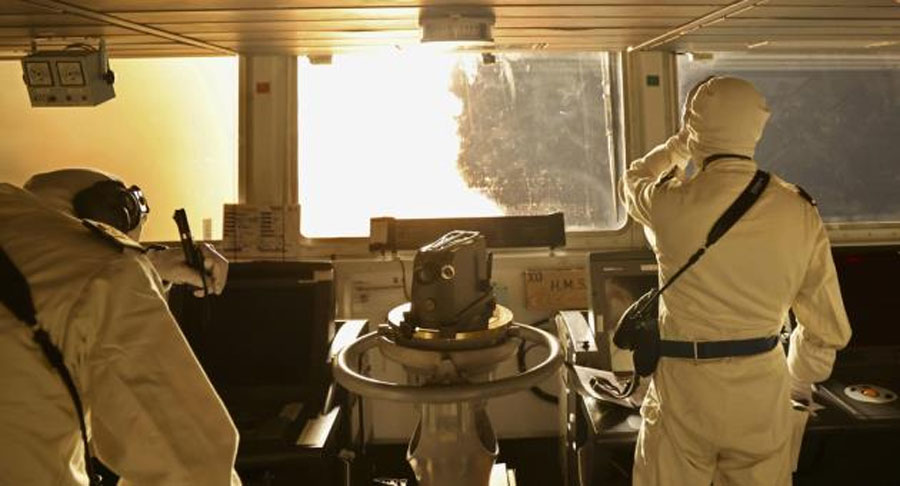International
US, UK launch massive retaliatory strikes against Iranian-backed Houthis in Yemen

US, UK launch massive retaliatory strikes against Iranian-backed Houthis in Yemen
The United States and United Kingdom militaries bombed more than a dozen sites used by the Iranian-backed Houthis in Yemen on Thursday, in a massive retaliatory strike using warship- and submarine-launched Tomahawk missiles and fighter jets, U.S. officials said.
The U.S. Air Force’s Mideast command said it struck over 60 targets at 16 sites in Yemen, including “command-and-control nodes, munitions depots, launching systems, production facilities and air defense radar systems.”
President Joe Biden said the strikes were meant to demonstrate that the U.S. and its allies “will not tolerate” the militant group’s ceaseless attacks on the Red Sea. And he said they only made the move after attempts at diplomatic negotiations and careful deliberation.
“These strikes are in direct response to unprecedented Houthi attacks against international maritime vessels in the Red Sea — including the use of anti-ship ballistic missiles for the first time in history,” Biden said in a statement.
He noted the attacks endangered U.S. personnel and civilian mariners and jeopardized trade, and he added, “I will not hesitate to direct further measures to protect our people and the free flow of international commerce as necessary.”
With each strike, fears grow that Israel, the US and Iran’s allies are inching closer to all-out war
Associated Press journalists in Yemen’s capital, Sanaa, heard four explosions early Friday local time.
Two residents of Hodieda, Amin Ali Saleh and Hani Ahmed, said they heard five strong explosions hitting the western port area of the city, which lies on the Red Sea and is the largest port city controlled by the Houthis. Eyewitnesses who spoke with the AP also said they saw strikes in Taiz and Dhamar, cities south of Sanaa.
The strikes marked the first U.S. military response to what has been a persistent campaign of drone and missile attacks on commercial ships since the start of the Israel-Hamas war. And the coordinated military assault comes just a week after the White House and a host of partner nations issued a final warning to the Houthis to cease the attacks or face potential military action. The officials described the strikes on condition of anonymity to discuss military operations. Members of Congress were briefed earlier Thursday on the strike plans.
READ ALSO:
- Real Madrid planning shock move for Victor Osimhen
- 2024 budget: Why we settled for N800/$ benchmark– Minister
- Hit-and-run driver kills police inspector on Lagos-Ibadan Expressway
The warning appeared to have had at least some short-lived impact, as attacks stopped for several days. On Tuesday, however, the Houthi rebels fired their largest-ever barrage of drones and missiles targeting shipping in the Red Sea, with U.S. and British ships and American fighter jets responding by shooting down 18 drones, two cruise missiles and an anti-ship missile. And on Thursday, the Houthis fired an anti-ship ballistic missile into the Gulf of Aden, which was seen by a commercial ship but did not hit the ship.
In a call with reporters, senior administration and military officials said that after the Tuesday attacks, Biden convened his national security team and was presented with military options for a response. He then directed Defense Secretary Lloyd Austin, who remains hospitalized with complications from prostate cancer surgery, to carry out the retaliatory strikes.
In a separate statement, U.K. Prime Minister Rishi Sunak said the Royal Air Force carried out targeted strikes against military facilities used by the Houthis. The Defense Ministry said four fighter jets based in Cyprus took part in the strikes.
Noting the militants have carried out a series of dangerous attacks on shipping, he added, “This cannot stand.” He said the U.K. took “limited, necessary and proportionate action in self-defense, alongside the United States with non-operational support from the Netherlands, Canada and Bahrain against targets tied to these attacks, to degrade Houthi military capabilities and protect global shipping.”
The governments of Australia, Bahrain, Canada, Denmark, Germany, Netherlands, New Zealand and South Korea joined the U.S. and U.K. in issuing a statement saying that while the aim is to de-escalate tensions and restore stability in the Red Sea, the allies won’t hesitate to defend lives and protect commerce in the critical waterway.
Russia, however, requested an emergency meeting of the U.N. Security Council on the strikes. France, the current council president, said it will take place Friday afternoon.
The rebels, who have carried out 27 attacks involving dozens of drones and missiles just since Nov. 19, had warned that any attack by American forces on its sites in Yemen will spark a fierce military response.
A high-ranking Houthi official, Ali al-Qahoum, vowed there would be retaliation. “The battle will be bigger … and beyond the imagination and expectation of the Americans and the British,” he said in a post on X.
Al-Masirah, a Houthi-run satellite news channel, described strikes hitting the Al-Dailami Air Base north of Sanaa, the airport in the port city of the Hodeida, a camp east of Saada, the airport in the city of Taiz and an airport near Hajjah.
READ ALSO:
- TB Joshua made childless couples to exchange spouses –Ex-worker
- LASU lecturer emerges UNILAG’s best PhD graduate
- Bandits kill village head, 2 sons, 6 others in Katsina
The Houthis did not immediately offer any damage or casualty information.
A senior administration official said that while the U.S. expects the strikes will degrade the Houthis’ capabilities, “we would not be surprised to see some sort of response,” although they haven’t seen anything yet. Officials said the U.S. used warplanes based on the Navy aircraft carrier USS Dwight D. Eisenhower and Air Force fighter jets, while the Tomahawk missiles were fired from Navy destroyers and a submarine.
The Houthis say their assaults are aimed at stopping Israel’s war on Hamas in the Gaza Strip. But their targets increasingly have little or no connection to Israel and imperil a crucial trade route linking Asia and the Middle East with Europe.
Meanwhile, the U.N. Security Council passed a resolution Wednesday that demanded the Houthis immediately cease the attacks and implicitly condemned their weapons supplier, Iran. It was approved by a vote of 11-0 with four abstentions — by Russia, China, Algeria and Mozambique.
Britain’s participation in the strikes underscored the Biden administration’s effort to use a broad international coalition to battle the Houthis, rather than appear to be going it alone. More than 20 nations are already participating in a U.S.-led maritime mission to increase ship protection in the Red Sea.
U.S. officials for weeks had declined to signal when international patience would run out and they would strike back at the Houthis, even as multiple commercial vessels were struck by missiles and drones, prompting companies to look at rerouting their ships.
On Wednesday, however, U.S. officials again warned of consequences.
“I’m not going to telegraph or preview anything that might happen,” Secretary of State Antony Blinken told reporters during a stop in Bahrain. He said the U.S. had made clear “that if this continues as it did yesterday, there will be consequences. And I’m going to leave it at that.”
READ ALSO:
- Keyamo sets performance standards for aviation CEOs
- Supreme Court delivers judgements in Kano, Plateau, Lagos, 4 others today
- Super Eagles needs Musa, Omeruo for 2024 AFCON victory – Ideye
The Biden administration’s reluctance over the past several months to retaliate reflected political sensitivities and stemmed largely from broader worries about upending the shaky truce in Yemen and triggering a wider conflict in the region. The White House wants to preserve the truce and has been wary of taking action in Yemen that could open up another war front.
The impact on international shipping and the escalating attacks, however, triggered the coalition warning, which was signed by the United States, Australia, Bahrain, Belgium, Canada, Denmark, Germany, Italy, Japan, Netherlands, New Zealand, Singapore and the United Kingdom.
Transit through the Red Sea, from the Suez Canal to the Bab el-Mandeb Strait, is a crucial shipping lane for global commerce. About 12% of the world’s trade typically passes through the waterway that separates Africa and the Arabian Peninsula, including oil, natural gas, grain and everything from toys to electronics.
In response to the attacks, the U.S. created a new maritime security mission, dubbed Operation Prosperity Guardian, to increase security in the Red Sea, Bab el-Mandeb Strait and the Gulf of Aden, with about 22 countries participating. U.S. warships, and those from other nations, have been routinely sailing back and forth through the narrow strait to provide protection for ships and to deter attacks. The coalition has also ramped up airborne surveillance.
The decision to set up the expanded patrol operation came after three commercial vessels were struck by missiles fired by Houthis in Yemen on Dec. 3.
The Pentagon increased its military presence in the region after the Oct. 7 Hamas attacks in Israel to deter Iran from widening the war into a regional conflict, including by the Houthis and Iran-backed militias in Iraq and Syria.
US, UK launch massive retaliatory strikes against Iranian-backed Houthis in Yemen
(AP)
International
$100m coin collection buried for decades to be auctioned

$100m coin collection buried for decades to be auctioned
A coin collection, much of which remained buried underground for over 50 years, is expected to surpass $100 million at auction, according to experts.
Named the Traveller Collection, this extraordinary assemblage is believed to be the most valuable coin collection ever brought to auction.
The coins will be sold gradually over the next three years, with the first auction set for May 20.
Beyond its immense value, the collection’s origins make for a fascinating tale.
Spanning over 100 territories and encompassing coins from ancient times to the modern era, the collection is being auctioned by Numismatica Ars Classica.
What sets it apart is that most of the coins remained hidden underground for half a century before resurfacing.
According to a press release shared with CNN, the anonymous collector behind the collection began acquiring gold coins after the Wall Street Crash of 1929.
Over time, he developed “a taste for coins with great historical interest, beauty and rarity” and eventually amassed approximately 15,000 coins.
During the 1930s, he and his wife traveled extensively across the Americas and Europe, acquiring rare and historically significant coins while meticulously documenting their purchases.
READ ALSO:
- EFCC re-arraigns son of ex-PDP chairman for alleged N2.2bn oil subsidy fraud
- Group says Natasha’s recall will deepen democracy
- We welcome Gov Makinde’s U-turn on Shari’ah panel – MURIC
Despite settling in Europe at a time when Hitler’s Nazi party loomed over the continent, the collector sensed the impending danger. In response, he carefully packed the coins into cigar boxes, which were then placed inside aluminum containers and buried underground, where they remained undisturbed for five decades.
Among the collection is a 50 Toman coin, part of an “exceedingly rare” set minted in Tehran and Isfahan during the late 18th and early 19th centuries.
International
AI will replace doctors, teachers, others in 10 years – Bill Gates

AI will replace doctors, teachers, others in 10 years – Bill Gates
Bill Gates, a co-founder of Microsoft, has claimed that improvements in artificial intelligence (AI) over the next decade may render humans superfluous for the majority of work.
In a recent interview with comedian Jimmy Fallon on NBC’s The Tonight Show in February, the billionaire philanthropist discussed how AI may take over many facets of life and business.
Gates remarked that expertise is currently “rare”, emphasising the continuous reliance on human specialists in industries such as medicine and education.
For example, we continue to rely on highly trained individuals, such as “a great doctor” or “a great teacher”, whose knowledge cannot be simply replaced by AI.
However, “with AI, over the next decade, that will become free, commonplace — great medical advice, great tutoring,” Gates said.
READ ALSO:
- Senate seeks FG’s immediate intervention to slash data prices
- Reno Omokri: Nigeria gives more opportunities than US, Britain, Canada
- Driver remanded for causing Osun varsity students’ death
In other words, Gates believes that the world is entering a new era of “free intelligence”, as he described in a recent interview with Harvard University professor and happiness specialist Arthur Brooks.
According to Gates, this transition will result in rapid breakthroughs in AI-powered technology, making them more accessible and affecting almost every part of our lives.
These breakthroughs will vary from more effective treatments and diagnoses to widely available AI instructors and virtual assistants.
“It’s very profound and even a little bit scary — because it’s happening very quickly, and there is no upper bound,” Gates told Brooks.
The discussion of how humans will fit into an AI-powered future continues.
Some analysts suggest that artificial intelligence will improve human productivity rather than completely replacing labour, hence driving economic growth and creating new jobs.
However, Microsoft AI CEO Mustafa Suleyman cautions that technological improvements in the coming years will disrupt the nature of most occupations across nearly all industries, potentially exerting a “hugely destabilising” influence on the workforce.
AI will replace doctors, teachers, others in 10 years – Bill Gates
International
Poland suspends migrants’ right to apply for asylum

Poland suspends migrants’ right to apply for asylum
Poland has temporarily suspended the right of migrants arriving in Poland via its border with Belarus to apply for asylum.
Prime Minister Donald Tusk announced it would be happening after the controversial bill, which will allow Polish authorities to suspend this right for up to 60 days at a time, was signed into law by President Andrzej Duda.
Tusk had said it would be adopted “without a moment’s delay” while Duda said the changes were needed to strengthen security on the country’s borders.
But the law has been criticized by rights groups including Human Rights Watch, which said the EU should take legal action against Poland if it was implemented.
The group urged the country’s parliament last month to reject the bill, saying it “flies in the face of Poland’s international and EU obligations” and could “effectively completely seal off the Poland-Belarus border, where Polish authorities already engage in unlawful and abusive pushbacks”.
READ ALSO:
- Trump slaps 25% tariffs on car imports to US
- Reps pass bill to strip Vice President, governors, deputies of immunity
- Businessman collapses in court during trial over $578,000 cash seizure
The government said previously the suspension would only be applied temporarily to people who pose a threat to state security, for example large groups of aggressive migrants trying to storm the border.
Exemptions will be made for unaccompanied minors, pregnant women, the elderly or unwell, anyone exposed to “real risk of serious harm” by being returned and citizens of countries accused of conducting the instrumentalization of migration – like Belarus
Tusk has dismissed criticism from human rights groups.
“Nobody is talking about violating human rights, the right to asylum, we are talking about not granting applications to people who illegally cross the border in groups organised by Lukashenko,” he said in October.
Since 2021, Poland, Lithuania, Latvia and Finland have seen a huge increase in the number of people crossing into their countries illegally from Belarus and Russia.
Polish authorities have sent thousands of troops and border guards to police its border with Belarus and built a 5.5-metre-high steel fence along 186 km of the frontier where at times several thousand migrants have been left stranded.
Rights groups estimate more than one hundred people have died on the borders between Belarus and Poland, Lithuania and Latvia since 2021.
EU eastern flank countries and the European Commission have accused the Belarusian and Russian authorities of weaponising migration to create a new route into the EU to destabilize the bloc.
Poland suspends migrants’ right to apply for asylum
BBC
-

 metro3 days ago
metro3 days agoAttack on Mufty of Ilorin: Onikijipa Family Charges Stakeholders to Call Sheikh Habibullahi Al-Ilory to Order
-

 metro24 hours ago
metro24 hours agoRivers administrator Ibas fires Fubara’s political appointees
-

 metro23 hours ago
metro23 hours agoJUST-IN: Ex-Oyo gov Ajimobi’s first child Bisola dies At 42
-

 International2 days ago
International2 days agoCanada removes bonus ranking points for job offers in Express Entry system
-

 metro2 days ago
metro2 days agoHow ritualists, native doctor drugged, murdered underage sisters in PH – Police
-

 Sports2 days ago
Sports2 days agoNigeria’s Super Eagles falter in W’Cup qualifiers against Zimbabwe, S’Africa lead, Egypt, Morocco qualify
-

 metro23 hours ago
metro23 hours agoFG declares public holidays for Eid-el-Fitr
-

 Africa1 day ago
Africa1 day agoNiger coup leader sworn in as president for five years











